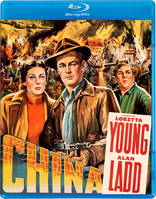China Blu-ray Movie
HomeChina Blu-ray Movie 
Kino Lorber | 1943 | 79 min | Not rated | Jan 04, 2022Price
List price:Amazon: $12.49 (Save 50%)
Third party: $12.49 (Save 50%)
Only 4 left in stock (more on the way).
Movie rating
7 | / 10 |
Blu-ray rating
| Users | 0.0 | |
| Reviewer | 2.5 | |
| Overall | 2.5 |
Overview
China (1943)
During the Japanese invasion of China, a cynical, macho profiteer meets a compassionate, beautiful schoolteacher.
Starring: Alan Ladd, Loretta Young, William Bendix, Philip Ahn, Iris WongDirector: John Farrow
| War | Uncertain |
| Drama | Uncertain |
Specifications
Video
Video codec: MPEG-4 AVC
Video resolution: 1080p
Aspect ratio: 1.35:1
Original aspect ratio: 1.37:1
Audio
English: DTS-HD Master Audio 2.0
Subtitles
English SDH
Discs
Blu-ray Disc
Single disc (1 BD)
Playback
Region A (locked)
Review
Rating summary
| Movie | 2.0 | |
| Video | 4.5 | |
| Audio | 4.5 | |
| Extras | 2.0 | |
| Overall | 2.5 |
China Blu-ray Movie Review
Reviewed by Dr. Svet Atanasov October 19, 2023John Farrow's "China" (1943) arrives on Blu-ray courtesy of Kino Lorber. The supplemental features on the release include exclusive new audio commentary by critic Eddy Von Mueller and vintage trailer for the film. In English, with optional English SDH subtitles for the main feature. Region-A "locked".
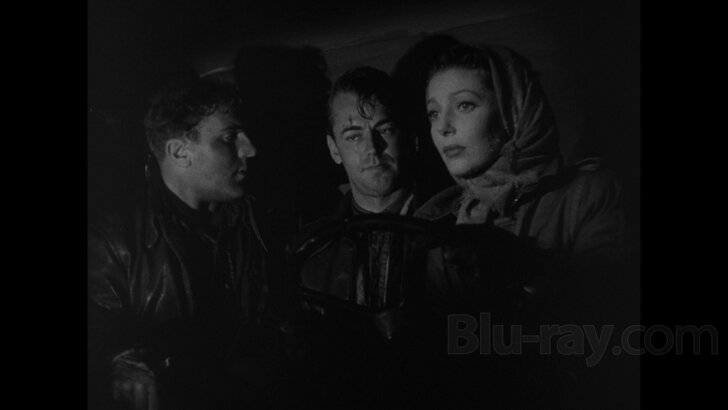
When John Farrow made China WWII was at its peak, so in a way, it is not at all surprising that it does a lot of very carefully scripted messaging. What is surprising is how poor the messaging is and how awful the stars of China look because of it. Before committing to do China, Alan Ladd, William Bendix, and Loretta Young had appeared in several quite big films, so they were not desperate to get parts in any film, regardless of its subject and production values. They could have chosen much, much better projects. So, why did they agree to do China?
I do not have a good answer. I saw China for the first time a few nights ago and since then have been pondering this question as well. It could not have been for the paychecks. It is easy to tell that China was done with a small budget -- mostly on the Paramount lots in Hollywood and a few outdoor locations in California and Arizona -- so its stars could not have been attracted by lucrative paychecks. The opportunity to work with Farrow, who had an established reputation in Hollywood, sounds like a good reason, but only if it is revealed that the stars were handed the screenplay hours before production was initiated. The only semi-logical reason I could come up with is that China had to happen very quickly because Ladd was soon to be drafted and top brass at Paramount greenlighted the project without carrying much about its quality. If this is what happened, and I think that it probably did, then China begins to make sense. It was a rushed project, meant to squeeze as much out of Ladd as possible before he put on a military uniform.
Ladd plays David Jones, a freelancing American businessman, who is in war-torn China selling oil with his partner Johnny Sparrow (Bendix). But because Jones is not playing by the rules – he sells to anyone willing to buy his product, including the Japanese invaders -- the Chinese authorities detain him and present him with an ultimatum: immediately change your business plan or get kicked out of the country. Shortly after he is released, Jones bumps into Carolyn Grant (Young), a Chinese-born American missionary teacher, who is trying to reach an unnamed university in Shanghai with a small group of Chinese girls. Jones and Sparrow operate a big truck that can transport Grant and her girls to their final destination, but Jones wants to go in a different direction and do as much business as possible. After several unexpected developments, however, Jones changes his mind and then joins the Chinese resistance forces as they clash with the Japanese invaders on the way to Shanghai.
The entire production is an unmitigated disaster. For example, instead of communicating, the stars constantly recite messages of the kind that military propaganda films would have enthusiastically used during the same period. Most of these messages randomly praise the courage and heroism of the Chinese soldiers and their vision of a new China that deserves to be like the country America was created to be, while the rest educate that there are far more important things in life than business and money. Along the way, Bendix also saves a Chinese baby, nicknames it Donald Duck, and declares that he could become a brand new man if together they are able to reach his family farm in rural Oregon. Unsurprisingly, Young emerges as the classic morally superior woman who could face any brute, overpower him, and then transform him into a lovable good man.
The film’s inexorable desire to be taken seriously, however, is undoubtedly what makes it irredeemable. The Chinese soldiers and peasants are American extras, with American manners and accents, acting on big studio lots loaded with American equipment. The desert footage from California and Arizona looks like desert footage from California and Arizona, too. And yet, the film desperately wants its audience to believe that the trip to Shanghai is entirely authentic and as dangerous as the travelers repeatedly claim it is.
Farrow was paired with Oscar-nominated cinematographer Leo Tover, whose credits include such vastly superior films as The Heiress, The Woman on the Beach, Hold Back the Dawn, and Dead Reckoning.
China Blu-ray Movie, Video Quality 
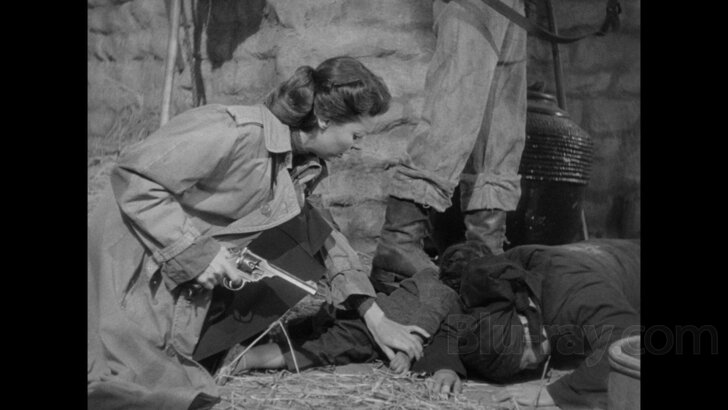
Presented in an aspect ratio of 1.35:1, encoded with MPEG-4 AVC and granted a 1080p transfer, China arrives on Blu-ray courtesy of Kino Lorber.
This film must have been remastered rather recently because it has a very stable, very attractive organic appearance with the type of qualities that are usually present on newer masters. To be perfectly clear, it has not been meticulously restored, which is why some of its visuals reveal minor blemishes, scratches, and dark spots. However, the element that was accessed to prepare the current master must have been in pretty good condition, and during the transfer work digital tools were not used to repolish it. This is why delineation, clarity, and depth are either good or very good. Despite some minor fluctuations, density levels remain good, too. The grayscale is very convincing. Blacks are stable and healthy. There are good ranges of equally attractive grays and whites. Image stability is very good. All in all, I think the master Universal has it in its vaults for China is very solid. (Note: This is a Region-A "locked" Blu-ray release. Therefore, you must have a native Region-A or Region-Free player in order to access its content).
China Blu-ray Movie, Audio Quality 

There is only one standard audio track on this Blu-ray release: English DTS-HD Master Audio 2.0. Optional English SDH subtitles are provided for the main feature.
All exchanges are very clear and easy to follow. Some unevenness is present, but it never becomes distracting. However, in multiple areas throughout the film, it feels like a filter might have been applied to eliminate background hiss. It is possible that some of the effects are inherited, but not all. I did not find this annoying or distracting, but I assume that some viewers will notice it. There are no audio dropouts to report in our review.
China Blu-ray Movie, Special Features and Extras 
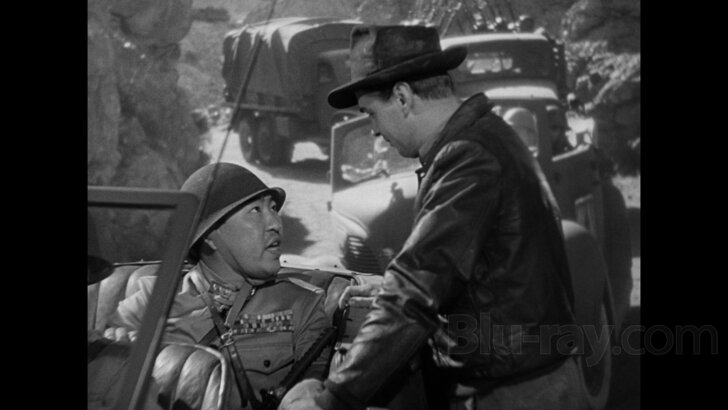
- Trailer - a vintage trailer for China. In English, not subtitled. (3 min).
- Commentary - this exclusive new audio commentary was recorded by critic Eddy Von Mueller.
China Blu-ray Movie, Overall Score and Recommendation 
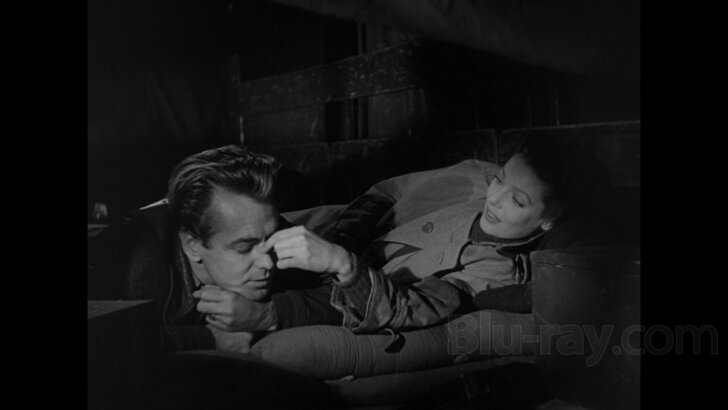
Alan Ladd does not belong in China, and the same is probably true about William Bendix and Loretta Young. This film is a rushed project and embarrassingly poor, often brashly insulting the intelligence of its audience in the worst possible ways. It reminded me of Peking Express, which is another terrible film that badly mismanages its stars and begins to look like a parody. Ladd was drafted in early 1943, so top brass at Paramount most likely quickly greenlighted China and had it done before their promising new star had to put on a military uniform. Kino Lorber's release is sourced from a very solid organic master.
Similar titles
Similar titles you might also like

Trapeze
1956

Sayonara
Limited Edition to 3000
1957

Thunder in the East
1952

Pittsburgh
1942

The Long, Hot Summer
Limited Edition
1958

Man on a Tightrope
1953

The Spanish Main
Warner Archive Collection
1945

The Mortal Storm
Warner Archive Collection
1940

Kings Go Forth
1958

Some Came Running
Warner Archive Collection
1958

Captain from Castile
Limited Edition to 3000
1947

Boy on a Dolphin
1957

All This, And Heaven Too
1940

Sherlock Holmes
1922

The Four Horsemen of the Apocalypse
Warner Archive Collection
1921

Come Back, Little Sheba
1952

Mary Stevens, M.D.
Warner Archive Collection
1933

The Russians Are Coming, the Russians Are Coming
1966

The Cheat
1931

Pinky
1949
